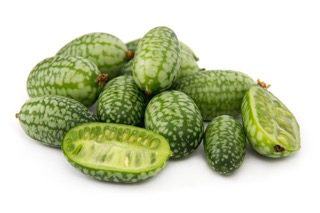

Although research on feeding cucamelons to dogs is limited, they are generally considered safe for canine consumption. Cucamelons are a rich source of antioxidants, beta-carotene, and lycopene, as well as vitamins C, E, K, and potassium.
Cucamelons, also known as Mouse melons or Mexican sour gherkins, offer a range of health benefits for dogs. The high fiber content supports digestive health, while the antioxidants and anti-inflammatory properties of lycopene and beta carotene can help boost the immune system.
While cucamelons are generally safe for dogs to eat, their small size can pose a choking hazard, particularly if swallowed whole. While no studies have been conducted specifically on the effects of cucamelons in dogs, they are not known to be toxic or harmful to canine health.
When feeding cucamelons to dogs, it’s important to offer them in moderation and cut them into small, bite-sized pieces to reduce the risk of choking. As with any new food, it’s best to introduce cucamelons gradually and monitor your dog’s reaction for any signs of digestive upset or allergic reaction.
Cucamelons, also known as Mouse melons or Mexican sour gherkins, are small fruits that are generally safe for canine consumption. They are originally from Mexico and Central America, but are now grown in other parts of the world such as Europe and the United States. Cucamelons are a great source of antioxidants, beta-carotene, and lycopene, as well as vitamins C, E, K, and potassium. These nutrients can help support your dog's immune system and digestive health. However, their small size can pose a choking hazard if not properly cut into small, bite-sized pieces.
Feeding cucamelons to dogs can be an affordable and easy option, as they are becoming more widely available in grocery stores and markets. To offer them to your furry friend, simply cut them into small pieces and offer them in moderation as part of a balanced diet. If your dog has never had cucamelons before, gradually introduce them and monitor their reaction for any signs of digestive upset or allergic reaction.
If cucamelons are not readily available or you want to switch things up, other alternatives include blueberries and raspberries, which are also high in antioxidants and fiber. As always, it's important to consult with your veterinarian before introducing any new food to your dog's diet.
Has your dog ever tried cucamelons before? How did they like them? Remember to always offer new foods in moderation and watch for any adverse reactions. Keep your furry friend happy and healthy with a balanced diet and plenty of love and attention.